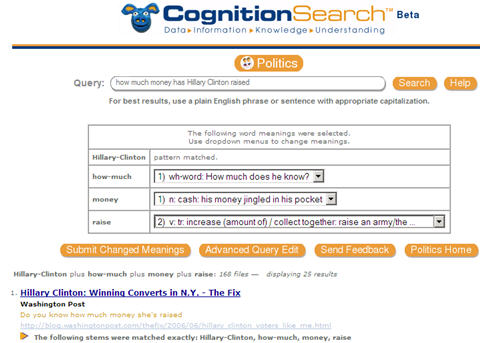CognitionSearch seeks more precise results

Cognition Technologies entered the search engine arena with CognitionSearch, which applies linguistic analysis of queries and documents to render more precise results than the popular search engines for English language queries. Currently, CognitionSearch is technology demonstration, focused on three discrete content categories--medicine, politics and legal. The company is also working with partners to embed its technology in legal and life sciences search applications.
According to Cognition CEO Scott Jarus, the company intends to encompass the entire Web after raising capital. "We need to raise $25 to $30 million to index the whole Web," Jarus said. "We could get the vast majority of more high traffic content done in six to nine months." The millions of dollars would be put into building a farm of 10,000 servers to manage the heavy lifting, indexing the content and queries for meaning. At this point, Jarus said Cognition is doing a $5 million venture capital round.

CognitionSearch's linguistic approach is differentiated from Google, Yahoo, Ask and others, which apply pattern matching to achieve relevant results. "We are meaning-based," Jarus said. "We taught the computer the meaning of virtually all words in common English. Google, Yahoo and Ask do pattern matching and don't know the meaning of words in a query. For example, if you do pattern matching and search for 'cars,' you only get car, not 'auto.' Some search engines add thesaurus enhancement of synonyms, but without the meaning it is ambiguous."
CognitionSearch understands the meaning of the user query and the content of the documents searched. The search engine's computational dictionary includes 350,000 word stems, 375,000 concepts, 17,000 ambiguous words, 108,000 phrases and 4 million semantic contexts. This affords a higher level of precision (returning accurate results) and recall (the breadth relevant results, such as including synonyms), Jarus said.
Jarus isn't claiming that CognitionSearch could eventually replace Google. "We view ourselves as augmenting pattern matching engines," he said. It turns out that pattern matching engines are good enough for most queries today, and very fast. If Cognition can prove out that its technology is superior to what Google and its brethren have in their labs in the linguistic search domain, it may end up being more than an external augmentation to existing engines.